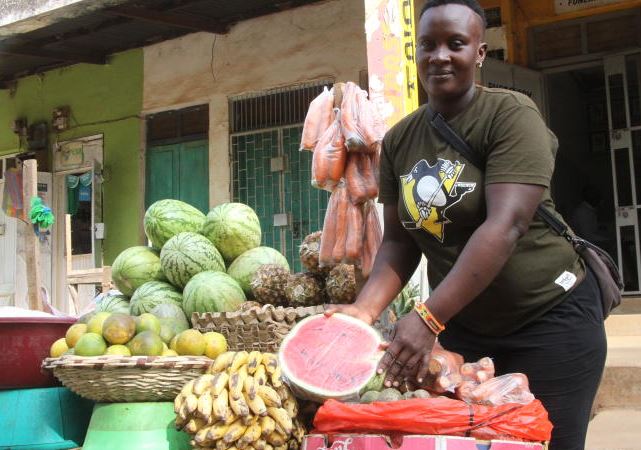A fruit vendor at Sokomjinga market in Migori town . [Caleb Kingwara, Standard] The end of the Covid-19 goodies has opened a new floodgate of economic difficulties, with consumers grappling with increased prices of basic commodities.
Interplay of low incomes and high cost of production has consigned millions of Kenyans into a life of destitution as they struggle with increased cost of electricity, transport and foodstuff such as bread, milk and cooking oil.
Besides the end of the Covid-19 goodies, the weakening of the shilling against major global currencies (another negative impact of the Covid-19) has also resulted in a spike in the cost of living for a majority of Kenyans.
Some of the Covid-19 goodies that came to an abrupt end, leaving Kenyans with less money in their pockets or bank accounts include tax relief measures, debt repayment holidays and the waiver of mobile money transaction fees. Read More
This even as some of the adverse effects of the pandemic – closure of businesses, pay cuts and job losses – continue to hold.
Products whose prices have shot up include electricity, milk, bread, onions, transport, school fees and cooking oil.
“It is not about the cost of living going up, it is about the effects of the coronavirus on people’s income,” said Joy Kiiru, an economics lecturer at the University of Nairobi.
Dr Kiiru said it will take some time before the crippling effects of the pandemic subside.
David Mukuha, the managing director at Naivas Supermarket, blamed the weakening of the shilling for the increase in prices of most of the products. Most of the finished products, or their raw materials, are bought from outside the country using foreign currencies such as US dollars.
However, a unit of the local currency is trading at around 110 against the dollar, having weakened from 103 before the country reported its first case of Covid-19.
A weak shilling makes imported items expensive. “Immediately the shilling weakens, it affects almost everything,” said Mukuha.But besides the prices of commodities going up, consumers do not also have as much money as they had before the pandemic to spend.Industries such as aviation and hospitality have barely recovered, with Kenya Airways, the national carrier, announcing a fresh round of pay cuts of up to 30 per cent effective this month.Moreover, a lot of hotels remain unoccupied while some have shut down completely, sending home thousands of workers.Kenya’s nascent 24-hour economy, which was anchored on nightclubs, […]
